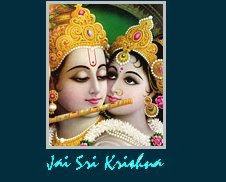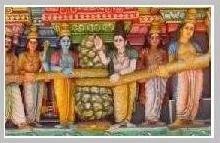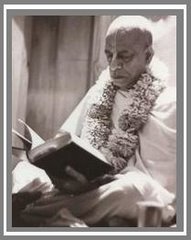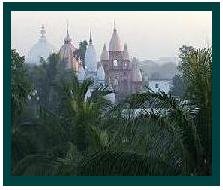oḿ pūrṇam adaḥ pūrṇam idaḿ
pūrṇāt pūrṇam udacyate
pūrṇasya pūrṇam ādāya
pūrṇam evāvaśiṣyate
pūrṇāt pūrṇam udacyate
pūrṇasya pūrṇam ādāya
pūrṇam evāvaśiṣyate
 oḿ — the Complete Whole; pūrṇam — perfectly complete; adaḥ — that; pūrṇam — completely perfect; idam — this phenomenal world; pūrṇāt — from the all-perfect; pūrṇam — complete unit; udacyate — is produced; pūrṇasya — of the Complete Whole; pūrṇam — completely, all; ādāya — having been taken away; pūrṇam — the complete balance; eva — even; avaśiṣyate — is remaining.
oḿ — the Complete Whole; pūrṇam — perfectly complete; adaḥ — that; pūrṇam — completely perfect; idam — this phenomenal world; pūrṇāt — from the all-perfect; pūrṇam — complete unit; udacyate — is produced; pūrṇasya — of the Complete Whole; pūrṇam — completely, all; ādāya — having been taken away; pūrṇam — the complete balance; eva — even; avaśiṣyate — is remaining.Translation:
The Personality of Godhead is perfect and complete, and because He is completely perfect, all emanations from Him, such as this phenomenal world, are perfectly equipped as complete wholes. Whatever is produced of the Complete Whole is also complete in itself. Because He is the Complete Whole, even though so many complete units emanate from Him, He remains the complete balance.
1: Everything animate or inanimate that is within the universe is controlled and owned by the Lord. One should therefore accept only those things necessary for himself, which are set aside as his quota, and one should not accept other things, knowing well to whom they belong.
2: One may aspire to live for hundreds of years if he continuously goes on working in that way, for that sort of work will not bind him to the law of karma. There is no alternative to this way for man.
3: The killer of the soul, whoever he may be, must enter into the planets known as the worlds of the faithless, full of darkness and ignorance.
4: Although fixed in His abode, the Personality of Godhead is swifter than the mind and can overcome all others running. The powerful demigods cannot approach Him. Although in one place, He controls those who supply the air and rain. He surpasses all in excellence.
5: The Supreme Lord walks and does not walk. He is far away, but He is very near as well. He is within everything, and yet He is outside of everything.
6: He who sees everything in relation to the Supreme Lord, who sees all living entities as His parts and parcels, and who sees the Supreme Lord within everything never hates anything or any being.
7: One who always sees all living entities as spiritual sparks, in quality one with the Lord, becomes a true knower of things. What, then, can be illusion or anxiety for him?
8: Such a person must factually know the greatest of all, the Personality of Godhead, who is unembodied, omniscient, beyond reproach, without veins, pure and uncontaminated, the self-sufficient philosopher who has been fulfilling everyone's desire since time immemorial.
9: Those who engage in the culture of nescient activities shall enter into the darkest region of ignorance. Worse still are those engaged in the culture of so-called knowledge.
10: The wise have explained that one result is derived from the culture of knowledge and that a different result is obtained from the culture of nescience.
11: Only one who can learn the process of nescience and that of transcendental knowledge side by side can transcend the influence of repeated birth and death and enjoy the full blessings of immortality.
12: Those who are engaged in the worship of demigods enter into the darkest region of ignorance, and still more so do the worshipers of the impersonal Absolute.
13: It is said that one result is obtained by worshiping the supreme cause of all causes and that another result is obtained by worshiping what is not supreme. All this is heard from the undisturbed authorities, who clearly explained it.
14: One should know perfectly the Personality of Godhead Śrī Kṛṣṇa and His transcendental name, form, qualities and pastimes, as well as the temporary material creation with its temporary demigods, men and animals. When one knows these, he surpasses death and the ephemeral cosmic manifestation with it, and in the eternal kingdom of God he enjoys his eternal life of bliss and knowledge.
15: O my Lord, sustainer of all that lives, Your real face is covered by Your dazzling effulgence. Kindly remove that covering and exhibit Yourself to Your pure devotee.
16: O my Lord, O primeval philosopher, maintainer of the universe, O regulating principle, destination of the pure devotees, well-wisher of the progenitors of mankind, please remove the effulgence of Your transcendental rays so that I can see Your form of bliss. You are the eternal Supreme Personality of Godhead, like unto the sun, as am I.
17: Let this temporary body be burnt to ashes, and let the air of life be merged with the totality of air. Now, O my Lord, please remember all my sacrifices, and because You are the ultimate beneficiary, please remember all that I have done for You.
18: O my Lord, as powerful as fire, O omnipotent one, now I offer You all obeisances, falling on the ground at Your feet. O my Lord, please lead me on the right path to reach You, and since You know all that I have done in the past, please free me from the reactions to my past sins so that there will be no hindrance to my progress.

***
The name of this text is linked to the word, īśā,
The Lord of all lords, Lord of Everything, Master of all Senses, My lord etc.
The Sanskrit term upanishad derives from upa- (nearby), ni- (at the proper place) and sad, "sitting down near" a bonified spiritual master (Guru Acharya ) in order to receive instruction.
***
The name of this text is linked to the word, īśā,
The Lord of all lords, Lord of Everything, Master of all Senses, My lord etc.
The Sanskrit term upanishad derives from upa- (nearby), ni- (at the proper place) and sad, "sitting down near" a bonified spiritual master (Guru Acharya ) in order to receive instruction.
***



















